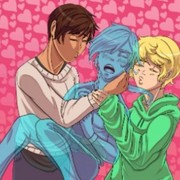Sir Thomas Lene led John away from the fay market onto a little bare path that wound through brushy thickets deeper into the wood. The faerie knight rode a big raw-boned horse with a wicked rolling eye, and John jogged at its side half in fear of its hoofs and teeth.
For the first mile he had the breath to talk.
“How long to reach Cleopolis? Will we come there ere the sunrise?”
“Oh, aye, there and back again.”
John looked up past the trees for the first time since he had come to Faerie. To his surprise the sky was not midnight-dark, but glowed with the deep blue of late dusk. All the stars shone with a steady golden light, as if here they were a little nearer to the earth, or a little younger than the sky. The arch of heaven itself seemed made of a substance something like still deep water, something like flawless glass, and something like a polished blue jewel.
He could have stared into it forever.
Sir Thomas jabbed him in the side with a pointed toe. “Climb out of heaven, friend,” he called. “You are wandering into my path.”
John moved out of the knight’s way.
“What time is it? How long until sunrise?”
Sir Thomas sighed. “Cleopolis lies deep in Faerie. ’Tis only in the borderlands that the rising sun will return you to mortal lands.”
They jogged a little further in silence. John tried another question:
“What happens on All Hallows’ Eve in the seventh year?”
From the knight’s silence, John wondered if he had misspoken. But when Thomas Lene answered at last, he spoke lightly, as if the thing was no matter. “Ah, that is the Day of Reckoning, ‘tis all, when debts and tiends are paid, and so each seventh year I go a-wandering from the faerie court until there is no danger of being called up.” There was a flash of eyes in the dark as he glanced down at John. “Never fear! As I told you, we can go and return ere Lammas is past.”
After that they went on silently for a little time, jog-trot, jog-trot, winding up hill and down dale through endless trees under that unchanging glass-blue heaven. Sir Thomas hummed “Jolly Good Ale and Old” under his breath. At last they circled a rowan-tree and on the far side saw a fork in the path. On the right, the forest path wound on between the trees, but on the left, straight and bordered with white stones, a new path ran uphill a little way and then vanished over the rise.
Sir Thomas pointed. “Look, fellow,” he said. “The path to the Court of Cleopolis.”
John stepped onto the new path, but Sir Thomas reined in. He glanced back at the faerie knight. “Are you not coming?”
“Aye. I am coming.” But still he made no move. “You say you seek the Rose for another?”
“For my promised wife. She was changed into a nightingale by a fay-woman.”
The harper knight took a hissing breath. “The Screech-Owl! Mab’s fevered dreams, it is no wonder you seek the Rose. The Witch of the Dark Tower feeds on the youth and beauty of every maid that tastes her food or drink.”
“You know of her?”
“Know of her, and fear her, as every dweller in Elfland.” And he spurred his horse into a trot and overtook John on the narrow path.
This led them over the rise and down again on the other side into a wide basin-shaped hollow in the wood, where the trees seemed to grow thicker and older than anywhere else, so that the pale-gold starlight was strangled and lost in the branches overhead. But the white stones ran straight as an arrow across the hollow to a house nestled in the centre.
Cleopolis was a big sprawling manor the size of a small city, its stone façade glowing with the lights of a thousand windows, so that its pilastered front seeemed more glass than wall. At its roof, ethereal pointed spires, little domed turrets, and golden weathervanes reached upward, twinkling in the moonlight; whimsical battlements defended the roof. The great brazen double doors stood open, and as elsewhere in Faerie, John heard the sound of music: viol, lute, and virginals.
“We have come at a time of festival,” John said doubtfully.
But Sir Thomas made an airy dismissive gesture. “They will permit us to enter.”
The knight led John up the steps, through the double doors, into an empty antechamber glowing with the light of a hundred tapers. As they passed the threshold, Sir Thomas shook himself a little and cried, “Ah! That’s better!”
The knight’s dented armour was gone and in its place he wore a velvet doublet over slashed trunks. John glanced down at himself and was surprised to see a pinked and slashed leather jerkin, a silk satin doublet, red hose, and a hanger where his knife had been.
“This is gentleman’s clothing,” he said uneasily, “and I am only a smith.”
Sir Thomas looked him up and down with an odd discomfort in his eyes. “It is,” he said, his voice echoing hollowly in the vast chamber. “But here in Faerie, a gentle heart may gentle a man’s condition. In mortal lands you were a smith; here you are a high lord, and your faith is worn on your sleeve.” He reached out a lean brown hand and touched the gold-pinked leather on John’s shoulder. “I cry you mercy, sir! But you must love the lady dearly.”
Love. That word that twisted and changed shape when you looked at it, until you were no longer sure of its having any meaning at all. John sighed. “What is love?”
“There, now,” said the knight with a smile, “surely it is no riddle, since you are here?”
“I have loved her,” said John after a moment, “in my own way. Not in the way maids and minstrels speak of loving, with sonnets and starving. I will keep my promise to her, and I will go to the end of the earth to free her, but I will not jangle at her window with a lute.”
“A dear happiness to the maid,” the knight said, laughing, with an odd twist in the corner of his mouth. And he stood, staring at John again, as if reluctant to go on.
Music fluted from behind the double doors ahead of them.
“Will you lead me to the Queen?”
But still Sir Thomas hung back. “Surely there is another way, friend.”
John shook his head. “Only the Rose.”
“But how can you be sure? There is still time. You can still turn back.”
“I am sure,” John insisted. “There is no other way. I have tried them all.”











Comments (0)
See all